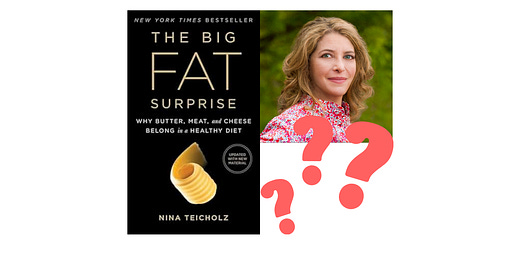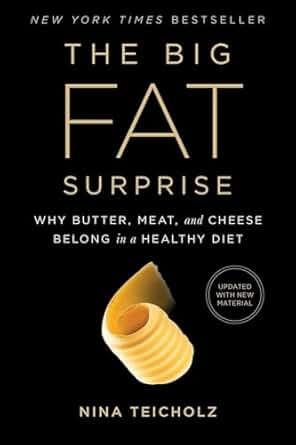Book Review: The Big Fat Surprise
Why Butter, Meat and Cheese Belong in a Healthy Diet by Nina Teicholz
As someone who was vegetarian and vegan for over 20 years, changing my diet felt like an impossible task, even when I was no longer feeling well. It felt like a moral failing, and when I transitioned slowly in 2021, it triggered an identity realignment. So much of my life - including the Jewish Food Hero and several recipe books - had been built around vegetarianism/veganism that I was embarrassed for a full year, telling no one but my family because I felt I was letting people down.
But as I started eating meat and dairy again, my physical and mental health improved dramatically. That prompted me to dig into the science behind the foods I was now eating. One book that profoundly shaped my understanding is The Big Fat Surprise: Why Butter, Meat and Cheese Belong in a Healthy Diet by Nina Teicholz.
This book challenges long-held beliefs about nutrition, specifically the idea that saturated fats are harmful. For someone like me, who spent several years eating a low-to-no oil vegan diet, someone who grew up thinking vegetarianism was the best thing for both my body and the planet, it was an eye-opener. It’s important to reeducate ourselves and let go of ideas that have been proven false. When I began my vegetarian and vegan journey at 12, I truly believed I was doing the right thing for my health. Now, I realize I was wrong.
I hope you enjoy this review and find it as thought-provoking as I did.
In The Big Fat Surprise, investigative journalist Nina Teicholz challenges one of the most entrenched beliefs in modern nutrition: that saturated fat is harmful to our health. Through meticulous research and storytelling, she uncovers how the demonization of butter, meat, and cheese may not only be unwarranted but has also contributed to the rise of modern health crises.
Teicholz takes readers on a fascinating journey into the origins of low-fat dietary guidelines, focusing on the influential (and flawed) studies of Ancel Keys in the mid-20th century. Keys’ theory that saturated fats were a primary cause of heart disease became the foundation for global dietary advice, despite being based on selective and incomplete data. Teicholz skillfully demonstrates how this flawed research set off decades of misguided nutritional policies, fueled by political agendas, industry influence, and scientific groupthink.
One of the book's most compelling critiques is of the low-fat diet movement. Teicholz explains how these dietary guidelines led to a surge in processed foods, refined carbohydrates, and industrial seed oils—factors she argues are far more damaging to health than saturated fats ever could be.
Reclaiming the Value of Animal Fats
Teicholz also highlights the health benefits of animal fats, which have been largely overlooked in recent decades. Among the benefits she discusses:
Absorption of Fat-Soluble Vitamins: Animal fats help the body absorb essential nutrients like vitamins A, D, E, and K, crucial for immunity, bone health, and cellular function.
Energy and Satiety: Fats are a concentrated energy source that keeps hunger in check and supports metabolic balance.
Cellular Health: Saturated fats are a key component of cell membranes, helping maintain their structure and function.
Brain Support: Since the brain is largely composed of fat, dietary fats are essential for cognitive health, memory, and emotional well-being.
Teicholz argues that these benefits, coupled with the lack of definitive evidence linking saturated fats to heart disease, make a strong case for reevaluating their place in a balanced diet.
Why This Book Is Worth Reading
Teicholz’s work offers a bold challenge to the nutritional status quo. Whether you agree with her conclusions or not, The Big Fat Surprise will make you question everything you thought you knew about fat. It’s particularly eye-opening for anyone curious about how science, policy, and cultural forces shape our food choices and health outcomes.
Perhaps one unexpected and pleasant consequence might be that you can shake off the outdated sense that delicious and satisfying foods like meats, cheeses and butter are bad for you. I have certainly enjoyed the changes to my meals and my health since I started eating saturated fats!
Final Thoughts
Though controversial, this book is an important read for those seeking a deeper understanding of the debates surrounding dietary guidelines. Teicholz pushes readers to think critically, question long-held assumptions, and demand higher standards from the science that informs public health policies.
If you’ve ever wondered why saturated fats were vilified—and whether they truly deserve that reputation—this book offers a refreshing and thought-provoking perspective.
Here’s to our Jewish health!
Kenden










